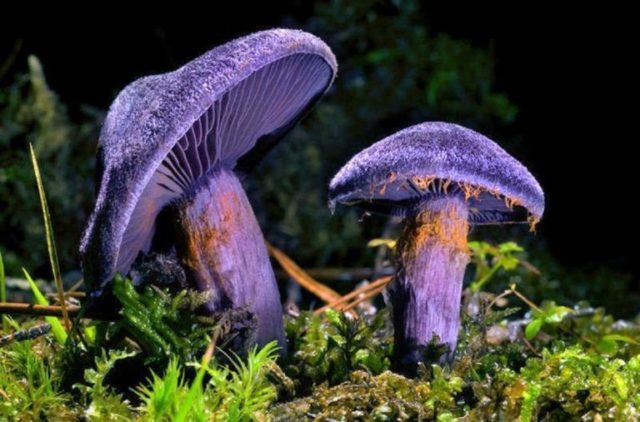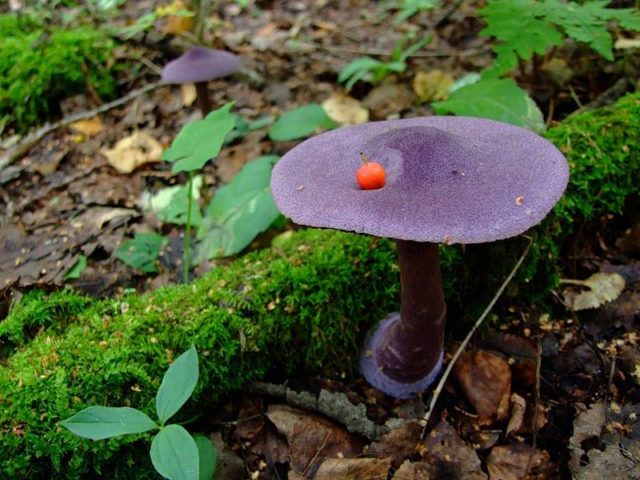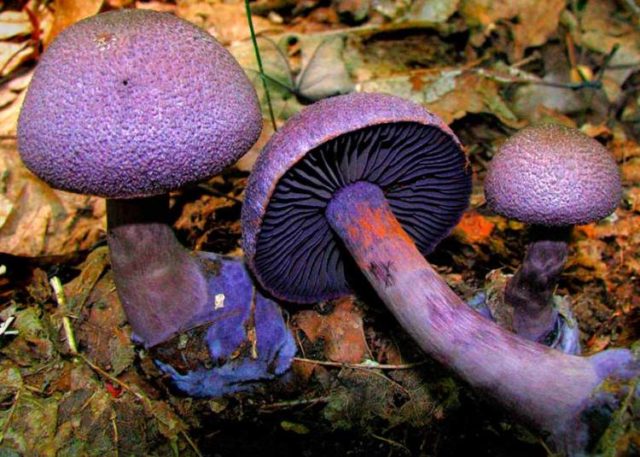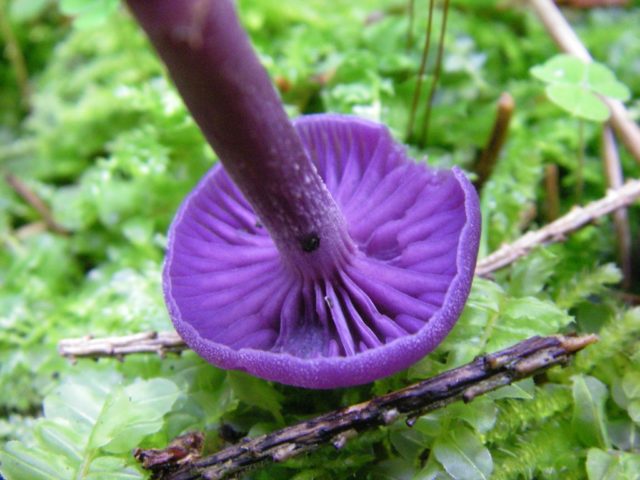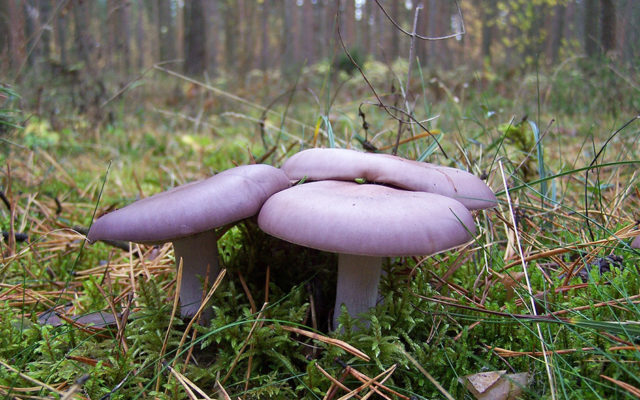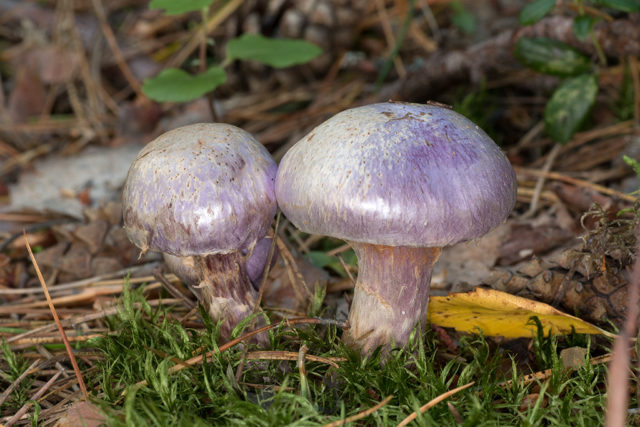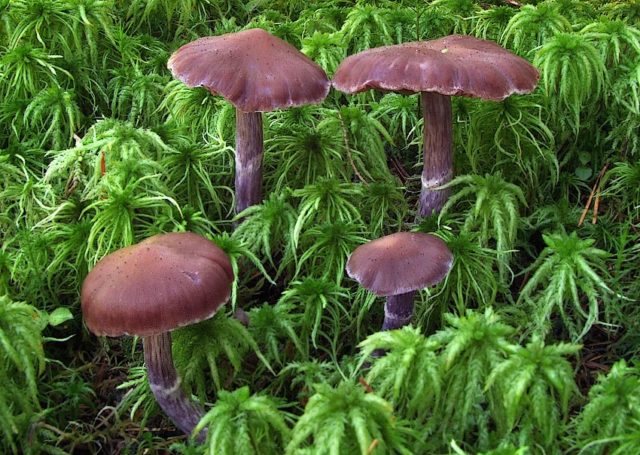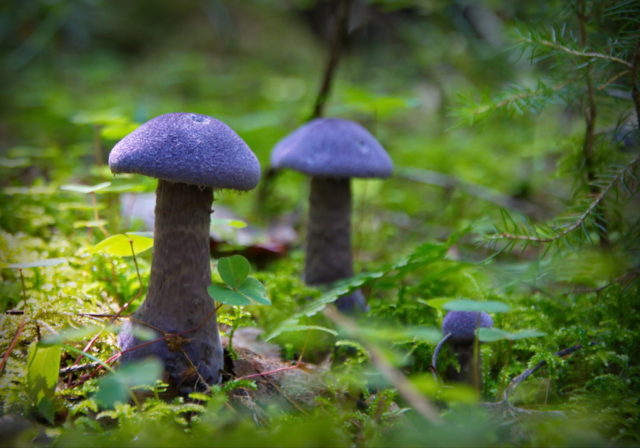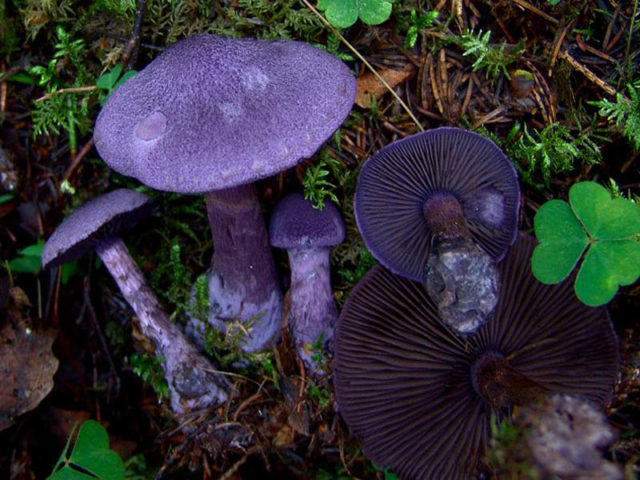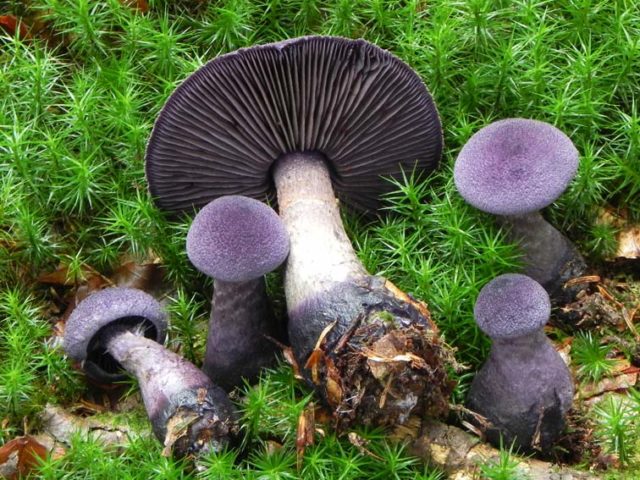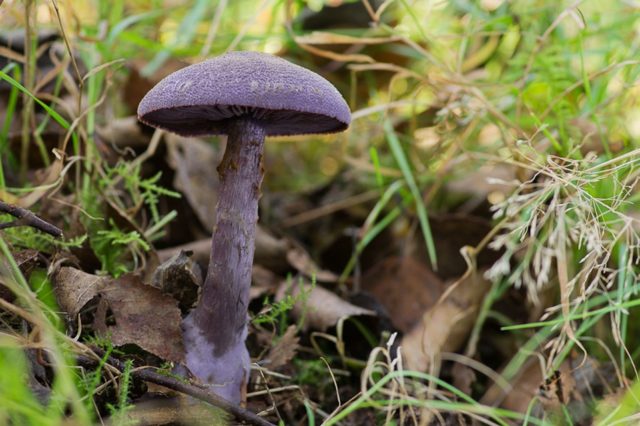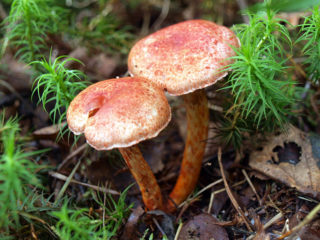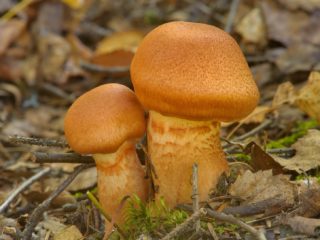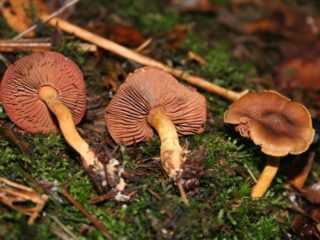Content
- 1 Description of the purple spider web
- 2 How and where does the purple spider web grow
- 3 Edible purple webcap or not
- 4 How to cook purple spiderwebs
- 5 Useful properties and contraindications of the purple spider web
- 6 The use of violet pans in pharmaceuticals
- 7 Interesting facts about purple spider webs
- 8 Conclusion
The purple spider web is a very unusual mushroom suitable for food consumption. It is quite simple to recognize it, but you should carefully study the description of the webcap itself and its false counterparts.
Description of the purple spider web
The mushroom, which is also called purple spiderweb or lilac spiderweb, belongs to the genus Spiderwebs and the Spiderwebs family. He has a very distinctive appearance that makes it easy to identify him in the forest.
Description of the hat
The cap of a purple spider web can reach 15 cm in diameter. In young fruiting bodies, it is convex and half spherical in shape, straightens out with age and becomes almost flat, but with a large tubercle in the center. The most striking feature of the spider web is the beautiful dark purple color of young mushrooms. Adult creepers fade and become almost white, but can retain a slight lilac hue.
A photo of a purple cobweb fungus shows that the skin on the cap is fibrous and slightly scaly, on the underside it is covered with wide and sparse purple plates. If you break it in half, then the dense pulp at the break will acquire a bluish tint. A faint pleasant aroma comes from the fresh pulp.
Leg description
The slender leg reaches only 2 cm in circumference, but can rise up to 12 cm above the ground in height. In the upper part it is covered with small scales, closer to the base there is a noticeable thickening. In the photo of a purple spider web, it can be seen that the texture of the leg is fibrous, the same dark color as the cap.
Doubles and their differences
Due to its unusual appearance, it is rather difficult to confuse the purple spiderweb mushroom with others by the photo and description. However, the cobweb has similar related species that require careful consideration.
Amethyst varnish
Lilac or amethyst varnish has a strong resemblance to the podolotnik. This lamellar mushroom also has a bright purple color of the cap and stem, similar to the pimple in outline and structure.
However, the varnish can be distinguished, first of all, by its size, it is very small, its cap does not exceed 5 cm in diameter. In the center, instead of a tubercle, there is a depression; at the edges, the cap becomes noticeably thinner and becomes wavy.
The mushroom belongs to the category of conditionally edible, therefore, confusing it with a cobweb, although undesirable, is not dangerous.
Purple row
A certain resemblance to the spiderweb has a purple ryadovka - an edible lamellar mushroom. The varieties are similar to each other in the shade of the cap - the young rows are also bright purple on both the upper and lower lamellar sides, and gradually fade with age.
But you can distinguish the fruiting bodies among themselves by the leg - at the ryadovka it is thick, dense and noticeably paler than the cap. The row is also suitable for eating.
Goat webcap
You can confuse the fishmonger with a related species - goat, or goat, cobweb. The similarity between mushrooms is that their caps have the same structure - at a young age they are convex, in an adult they are prostrate and with a tubercle in the middle part. Young goat cobwebs are also purple in color.
However, with age, the fruit bodies of the goat's webcap become more gray-gray, and the plates on the lower part of its cap are not purple, but rusty brown. Another difference lies in the unpleasant smell emanating from the goat's webcap - mushroom pickers claim that it smells of acetylene.
Glorious Webcap
Under certain circumstances, the fishmonger can be confused with a poisonous twin - a brilliant spider web. Both mushrooms have at first a convex and then a prostrate cap with a tubercle in the center, a long thin stem and a lamellar underside of the cap.
The main difference is color. If the purple spider has a rich lilac color, then the cap of the brilliant cobweb is reddish brown or chestnut with a faint purple tint. The brilliant webcap is inedible and poisonous. If the mushroom found is more similar to it in description, then it is better to leave the find in the forest.
How and where does the purple spider web grow
In terms of its distribution, the purple pimple is found in almost the entire world. It grows in Europe and America, Japan, Great Britain and Finland.
In Russia, the mushroom grows not only in the middle lane, but also in the Leningrad and Murmansk regions, near Novosibirsk and Tomsk, in the Chelyabinsk region, in the Krasnoyarsk Territory and in Primorye. You can meet the edible purple spiderweb mushroom in coniferous and mixed forests, mainly next to pines and birches. It grows mostly singly, but sometimes forms a few groups. The main fruiting season is in August, and the mushroom can be found until October in humid and shaded places.
Edible purple webcap or not
The purple webcap from the Red Book is an edible mushroom with a very pleasant delicious taste. It is suitable for all types of food processing and does not require any special preliminary preparation.
How to cook purple spiderwebs
Podbotnik is rarely fried and added to soups - much more often it is salted or pickled. According to mushroom pickers, it is much tastier when cold. But before any processing, it is necessary to carry out initial preparation.
The preparation consists in the fact that the pribolotnik must be cleaned of forest debris, rinsed in cold water and remove the skin from its cap. It does not require soaking, since there are no toxic substances in it, and there is no bitterness in the pulp either. Immediately after cleaning, it is immersed in salted water and boiled for an hour.
Pickled Purple Cobweb
A simple recipe for making a mushroom suggests pickling the purple mushroom for further storage. It is very easy to do this:
- First, put 2 liters of water on the fire and add salt, sugar and vinegar to it in 2 large spoons, as well as 5 cloves of garlic, 5 peppercorns and a bay leaf.
- After the marinade has boiled, 1 kg of boiled parsley is poured into it and kept on fire for another 20 minutes.
- Then the mushrooms are laid out in sterile jars prepared in advance and poured with hot marinade to the top.
The blanks are closed with lids, allowed to cool under warm blankets, and then put into the refrigerator for long-term storage.
Salty purple spider web
Pre-boiled mushrooms can be salted - the recipe is very simple and accessible even for beginners. In small layers, the violet pribolotnik should be placed in glass jars, generously sprinkling each layer with salt so that, as a result, a layer of salt appears on top of the jar. You can also add some garlic, dill, pepper or bay leaves if desired.
The filled jar is covered with gauze or a thin cloth, and pressed on top with a heavy load. After a couple of days, juice will be released in the jar, which will cover the mushrooms entirely, and after another 40 days, the pot will be ready for consumption. In the process of salting, it is necessary from time to time to remove the oppression and change the fabric or gauze so that it does not mold from moisture.
Useful properties and contraindications of the purple spider web
The rare purple mushroom mushroom is not only tasty, but also very useful. In large quantities, its pulp contains:
- B vitamins;
- copper and manganese;
- zinc;
- vegetable protein.
The pantyliner has pronounced anti-inflammatory properties and is able to strengthen the immune system. It also benefits the heart and blood vessels, in particular, lowers glucose levels and prevents the development of diabetes.
There are not so many contraindications for the fungus, however, it is not recommended to use it for allergies and severe diseases of the gastrointestinal tract, kidneys and liver during an exacerbation. It is better to refuse the cobweb, like any other mushrooms, to pregnant women and nursing mothers, and you should also not offer mushroom pulp to children under 7 years of age.
The use of violet pans in pharmaceuticals
It is necessary to mention the medicinal properties of the rare mushroom. Thanks to the vitamins and other valuable substances in the composition, the violet podolotnik is used to create antifungal drugs and antibiotics. You can also find a podolotnik in the composition of funds that help with hypoglycemia - the mushroom lowers blood sugar levels.
Interesting facts about purple spider webs
Not all mushroom pickers have heard about the purple cobweb. This is partly due to the rarity of the Red Data Book mushroom. But another reason is that the bright colors of the pistils make many people take it for a poisonous mushroom and ignore it.
Violet podolotnik is used not only in cooking and medicine, but also in industry. Environmentally friendly paints are made with the use of a pribolotnik The natural dye in the pulp of the mushroom is completely safe, but it is highly persistent.
A purple mushroom is called a cobweb due to the fact that young fruiting bodies from the underside of the cap are covered with a continuous dense cobweb. With age, this veil breaks and disappears, but even in adult creepers, you can sometimes notice its remnants on the edges of the cap and on the leg.
Conclusion
The purple spider web is a very rare but beautiful and delicious mushroom. Finding it in the forest will be a real success, but at the same time mushroom pickers have chances throughout Russia, since the mushroom is ubiquitous.
